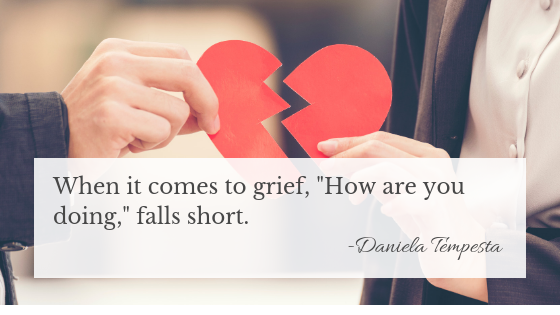Consoling a grieving friend can feel a bit like trying to find your way around an unfamiliar city without a map. Despite the fact that death is something we must all experience, we avoid talking or thinking about our mortality as if by ignoring it we can make it disappear.
Not until losing my mother to breast cancer earlier 5 years ago did I become all too familiar with the painful journey of grief. It is a difficult path.
There is no Google map that can provide perfect guidance on how to support someone who is navigating loss. There are, however, some routes that are more effective than others.
Based on my personal and professional experience with loss, here are five suggestions on how to best help someone who is grieving.
1. Unconditional Communication: Consistently Check in Without Expecting or Requesting a Response
After my mom died, I received hundreds of messages and calls from people sharing their memories of her and offering their heartfelt condolences. Receiving all of these messages felt like being held in a gigantic loving embrace. It was a good feeling.
But I was too grief stricken to do much of anything at all. Etiquette went out the window. Even simple tasks like responding to an email or a text message seemed like too much.
After a few weeks passed the steady stream of messages turned into more of a trickle, but the few that remained were the most impactful — they were the friends who continued to check in consistently.
From pure exhaustion, I often chose not to respond, but I felt incredibly supported by these messages and much less alone. It was clear in their communications, either implicitly or explicitly, that they did not expect or need a response. They just wanted me to know that when I was ready to fall apart, they had their emotional superglue ready to help me put back together the pieces.
2. Simple Acts of Service
In the weeks and months that followed my mom’s passing, I was so depressed it was hard to function. The simplest things felt like climbing Mount Everest.
Simultaneously, many of my friends told me they felt helpless, desperately wanting to help me but confused as to how. When friends offered to assist me with tasks both mundane and major, it was a huge relief.
Simple acts of service are really a win/win. The bereaved person gets support they need, and at the same time, their loved ones feel like they have a concrete way to help out.
When in doubt, ask. “Can I go to the grocery store for you?” “Can I come over and help you with some of the paperwork?” “Can I help you fold the laundry?”
When you are grieving you are too mentally disorganized to know what you need and having people lay out options of what they can do for you is a huge relief and makes a big difference.
3. Wording Matters
One of the most challenging things for me after my mom passed was dealing with the well-intentioned, yet very difficult question of how I was doing.
It is a pleasantry. We pose it to everyone, even the checker at the grocery store, but when it comes to grief it falls short.
When people would ask me how I was doing I would politely reply “I’m hanging in there,” or “doing as well as can be expected,” or “I’m just taking it day by day,” but in reality I wanted to throw myself to the ground in a fit of childlike rage and scream “I am not okay!”
Giving fake responses felt deceitful and invalidating of my experience, yet throwing temper tantrums wasn’t going to be appropriate either.
If you really want to know how the person is doing, add a qualifier to your statement — “How are you doing, like really, give me the honest version not the sugar-coated version.” Let the person know that they don’t have to protect you from their grief.
4. Be Patient: Grieving People Push When They Should Pull
When you are digesting an enormous loss, it can feel like no one else in the world understands. This can cause a bereaved person to push others away rather than accept the emotional support that is offered to them.
Bear in mind that the grieving person is coming face to face with mortality, perhaps for the first time. While intellectually we all know that everything is impermanent, emotionally we hide from this reality.
After losing a loved one, all relationships start to feel threatened. You realize that you can and will at some point lose everyone. This is a terrifying realization. Our primitive psychological response is to shield ourselves from further pain and suffering of loss, by pushing people away… if we have no one to lose then we cannot experience this pain again.
Of course, the real task of the grieving person is to make peace with impermanence, but it may take some time to figure that out. Be patient with your friend or loved one, eventually they will come back around.
5. Just Listen
There are no right things to say when someone is grieving.
We are all different and there is no one response that is correct, nor is there anything you can say that will change the situation. Accept this reality and focus on listening.
You can even say, “I know there is really nothing I can say that will help, but I am here to listen.” Let the person know that their emotions are not a burden or too much for you.
When my mom died, I wanted to talk about her and what I’d been through during the last two months of her life ALL THE TIME. Yet, I rarely did.
I felt so worried about burdening people with my emotions or overwhelming people with my grief. The few times that I did take the risk to share with people, I found that they welcomed my expressions with open arms, and in fact felt relieved to be able to be helpful.
In turn, I felt a huge weight lifted off of me.
The Tempesta Group is Offering a Grief Support Group!
If you are local in the bay area, and know someone who is struggling with grief, please let them know about our grief group.
Be well,
Daniela




